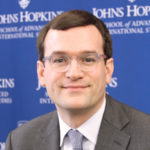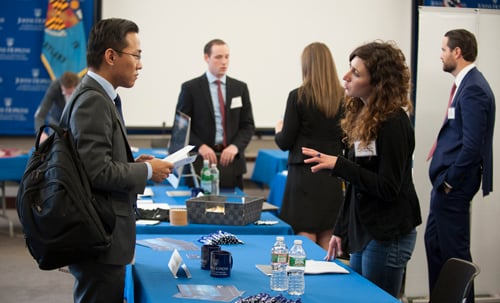Launching a Career in International Affairs
THIS GUIDE IS NO LONGER ACTIVE. For the current FP Guide, click here.
Johns Hopkins University,
School of Advanced International Studies
An impressive 96 percent of graduates in the class of 2016 at the Johns Hopkins University (JHU) School of Advanced International Studies (SAIS) found relevant employment within six months of graduation or were pursuing further studies, and they were hired by 220 different employers. As the next graduating classes face uncertainties in public sector hiring and a tightening of visa restrictions around the world, the job of finding a job could get tougher.
“One of our key jobs as career counselors is to make sure you have access to a strong network of employers,” says Jean-Amiel Jourdan, director of Global Careers at SAIS.
About 50 percent of 2016 graduates from SAIS are working in the private sector, and another 30 percent are employed by multilateral organizations or NGOs. Only 20 percent or so took jobs in the public sector, where budget cuts could put a damper on future hiring. However, more half of the 20 percent of those in the public sector are employed either in the intelligence community or in the Presidential Management Fellows Program. Those areas, along with Defense Department hiring, are unlikely to face cutbacks.

“One of our key jobs as career counselors is to make sure you have access to a strong network of employers.” – Jean-Amiel Jourdan, Director, Global Careers, School of Advanced International Studies (SAIS), Johns Hopkins University
“The CIA recruits a critical mass of SAIS students each year and comes to campus 10 times a year. SAIS is one of their target schools,” says Jourdan.
But what if your goal is to work for the U.S. government helping with development projects, such as building an electricity grid in a developing country? “If there is a lack of opportunities with USAID or with private contractors working for USAID, we will help you find other stakeholders,” says Jourdan. “For example, one opportunity might be with a for-profit energy consultancy in the Gulf.”
Each year, the SAIS Office of Global Careers polls students and monitors job market trends to identify what skills courses to offer to enhance students’ competitiveness. For example, courses have covered geographic information systems (GIS), Tableau, and social network analysis (SNA).

The SAIS Office of Global Careers hosts an annual Career Fair at the Washington, DC campus.
To help students connect with prospective employers, SAIS offers Global Career Treks around the world and to U.S. cities such as New York; Washington, D.C.; San Francisco; and Houston. This year, the Office of Global Careers also took a group of students to Denver to explore growing opportunities in renewable energy.
While international students at U.S. schools face increasing visa restrictions on post-graduation employment in the United States, Jourdan points to countries with rising demand for professionals with a strong skill set in economics, finance, cultural and regional knowledge, and local language fluency: In Africa (Morocco, Nigeria, and Kenya); in the Gulf (Qatar and the United Arab Emirates); and in Southeast Asia (Malaysia and Indonesia).
SAIS Global Careers does employer outreach from alumni worldwide and from three SAIS campuses: Washington, D.C.; SAIS Europe in Bologna, Italy; and the Hopkins-Nanjing Center in China.
“We are poised to see the strength of emerging global opportunities,” says Jourdan.
For more information see the Program Directory
Contents
- Launching a Career in International Affairs
- New York University School of Professional Studies (NYUSPS), Center for Global Affairs (CGA)
- Georgetown University, Walsh School of Foreign Service (SFS)
- UC San Diego, School of Global Policy and Strategy (GPS)
- Johns Hopkins University (JHU), School of Advanced International Studies (SAIS)
- The Fletcher School of Law and Diplomacy at Tufts University
- Statecraft Simulations